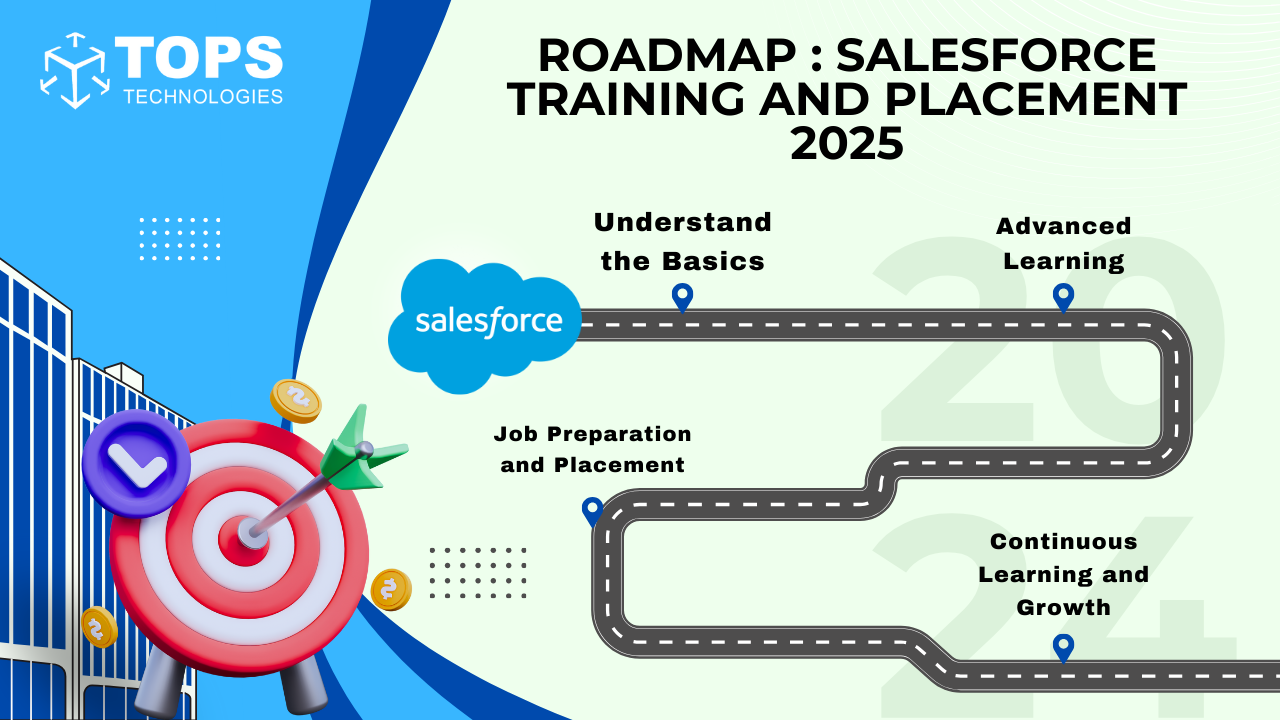A clear roadmap can help individuals aspiring to build a career in Salesforce gain the necessary skills, certifications, and experience. Below is a step-by-step guide:

Phase 1: Understand the Basics
What is Salesforce?
Understand Salesforce as a CRM platform and its significance in business operations.
Explore Salesforce products like Sales Cloud, Service Cloud, Marketing Cloud, and Platform.
Learn CRM Fundamentals
Understand the role of CRM in business.
Familiarize yourself with terms like Leads, Accounts, Contacts, Opportunities, and Cases.
Set Up a Salesforce Account
Sign up for a free Salesforce Developer account to access a sandbox environment for practice.
Phase 2: Gain Core Knowledge
Trailhead (Salesforce's Learning Platform)
Start with Beginner Trails like "Admin Beginner" and "Developer Beginner."
Focus on modules such as:
- Salesforce Basics
- Data Management
- User Management
- App Customization
Understand Salesforce Ecosystem
- Get familiar with Salesforce objects, fields, relationships, and workflows.
- Learn the basics of Lightning Experience.
Hands-On Practice
Customize applications in your sandbox, create reports, dashboards, and automation tools like Flows and Process Builder.
Phase 3: Get Certified
Select a Certification Path
- For Admins: Salesforce Certified Administrator.
- For Developers: Salesforce Certified Platform Developer I.
- For Consultants: Salesforce Sales Cloud/Service Cloud Consultant.
Prepare for Certification
- Study using Salesforce Trailhead, mock tests, and certification guides.
- Join Salesforce communities for tips and insights.
Take the Exam
- Schedule and pass your chosen certification.
Phase 4: Advanced Learning
Specialized Skills
- Learn advanced concepts like:
- Apex (Salesforce programming language)
- Visualforce
- Lightning Web Components (LWC).
Integrations and APIs
- Learn how to integrate Salesforce with other systems using REST and SOAP APIs.
Phase 5: Build a Portfolio
Real-World Projects
- Work on sample or real-world projects to demonstrate skills in creating applications, automating workflows, or customizing Salesforce platforms.
Contribute to Open Source
- Contribute to Salesforce-focused GitHub repositories or projects.
Document Your Work
- Create a portfolio with case studies, screenshots, and documentation of your Salesforce projects.
Phase 6: Job Preparation and Placement
Resume and LinkedIn Optimization
- Highlight Salesforce certifications, skills, and projects on your resume and LinkedIn profile.
Mock Interviews
- Practice Salesforce interview questions related to administration, development, and consulting.
Leverage Salesforce Communities
- Network on platforms like Salesforce Trailblazer Community, LinkedIn, and local user groups.
Work with Placement Agencies or Programs
- Collaborate with organizations offering Salesforce training and placement assistance like TOPS Technologies, which can guide you with certifications and help you build confidence through mock interviews. Additionally, you can enhance your learning by enrolling in related courses such as a Software Testing Course for better career versatility.
Phase 7: Continuous Learning and Growth
Stay Updated
- Salesforce updates its platform thrice a year. Stay informed about new features and improvements.
Expand Skills
- Learn related tools like Tableau (for analytics), MuleSoft (for integration), and Slack (for collaboration).
Pursue Advanced Certifications
- Examples include Salesforce Architect certifications or specific Cloud certifications.
Mentorship and Volunteering
- Offer your skills to non-profits via Salesforce’s "Power of Us" program or mentor others.






